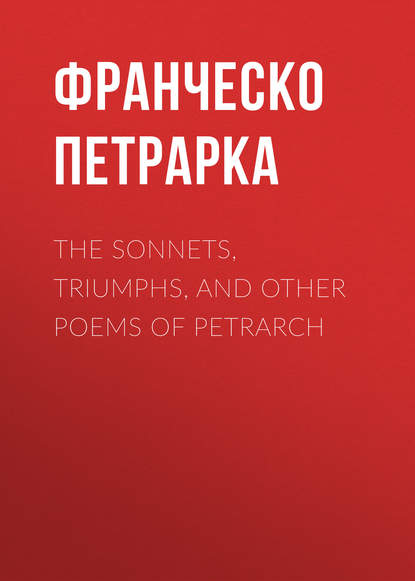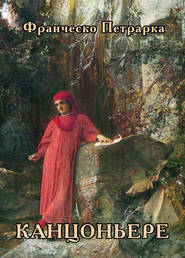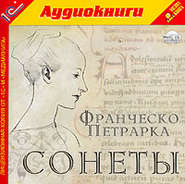По всем вопросам обращайтесь на: info@litportal.ru
(©) 2003-2025.
✖
The Sonnets, Triumphs, and Other Poems of Petrarch
Настройки чтения
Размер шрифта
Высота строк
Поля
The sad memorial of my ancient pain;
That day, the source of long-protracted woe,
When I began the plagues of Love to know,
Hyperion's throne, along the azure field,
Between the splendid horns of Taurus wheel'd;
And from her spouse the Queen of Morn withdrew
Her sandals, gemm'd with frost-bespangled dew.
Sad recollection, rising with the morn,
Of my disastrous love, repaid with scorn,
Oppressed my sense; till welcome soft repose
Gave a short respite from my swelling woes.
Then seem'd I in a vision borne away,
Where a deep winding vale sequester'd lay;
Nor long I rested on the flowery green
Ere a soft radiance dawn'd along the scene.—
Fallacious sign of hope! for, close behind,
Dark shades of coming woe were seen combined.
There, on his car, a conqu'ring chief I spied,
Like Rome's proud sons, that led the living tide
Of vanquished foes, in long triumphal state,
To Capitolian Jove's disclosing gate.
With little joy I saw the splendid show,
Spent and dejected by my lengthen'd woe;
Sick of the world, and all its worthless train,
That world, where all the hateful passions reign;
And yet intent the mystic cause to find,
(For knowledge is the banquet of the mind)
Languid and slow I turn'd my cheerless eyes
On the proud warrior, and his uncouth guise.
High on his seat an archer youth was seen,
With loaded quiver, and malicious mien
Nor plate, nor mail, his cruel shaft can ward,
Nor polish'd burganet the temples guard;
His burning chariot seem'd by coursers drawn;
While, like the snows that clothe the wintry lawn
His waving wings with rainbow colour gay
On either naked shoulder seem'd to play;
And, filing far behind, a countless train
In sad procession hid the groaning plain:
Some, captive, seem'd in long disastrous strife,
Some, in the deadly fray, bereft of life;
And freshly wounded some. A viewless hand
Led me to mingle with the mornful band,
And learn the fortunes of the sentenced crew,
Who, pierced by Love, had bid the world adieu.
With keen survey I mark'd the ghostly show,
To find a shade among the sons of woe
To memory known: but every trace was lost
In the dim features of the moving host:
Oblivion's hand had drawn a dark disguise
O'er their wan lineaments and beamless eyes.
At length, a pallid face I seem'd to know;
Which wore, methought, a lighter mask of woe;
He call'd me by my name.—"Behold!" he cried,
"What plagues the hapless thralls of Love abide!"—
"How am I known by thee?" with new surprise
I cried; "no mark recalls thee to my eyes."—
"Oh, heavy is my load!" he seem'd to say;
"Through this dark medium no detecting ray
Assists thy sight; but I, like thee, can boast
My birth on famed Etruria's ancient coast."—
The secret which his murky mask conceal'd,
His well-known voice and Tuscan tongue reveal'd;
Thence to a lighter station we repair'd,
And thus the phantom spoke, with mild regard:—
"We thought to see thy name with ours enroll'd
Long since; for oft thy looks this fate foretold."—
"True," I replied; "but I survived the strife:
His arrows reach'd me, but were short of life."—
Pausing, he spoke:—"A spark to flame will rise,
And bear thy name in glory to the skies."—
His meaning was obscure, but in my breast
I felt the substance of his words impress'd,
As sculptured stone, or monumental brass,
Keeps the firm record, or heroic face.
With youthful ardour new, and hope inspired,
Quick from my grave companion I required
The name and fortunes of the passing train.
And why in mournful pomp they trod the plain—
"Time," he return'd, "the secret then will show,
When thou shalt join the retinue of woe:
But years shall sprinkle o'er thy locks with gray,
And alter'd looks the signs of age betray,
Ere at his powerful touch the fetters fall,
Which many a moon thy captive limbs shall gall:
Yet will I grant thy suit, and give to view
The various fortunes of the captive crew:
But mark their leader first, that chief renown'd—
The Power of Love! by every nation own'd.
His sway thou soon, as well as we, shalt know,
Stung to the heart by goads of dulcet woe.
In him unthinking youth's misgovern'd rage,
Join'd with the cool malignity of age,
Is known to mingle with insidious guile,
Deep, deep conceal'd beneath an infant's smile.
The child of slothful ease, and sensual heat—
By sweet delirious thoughts, in dark retreat,
Mature in mischief grown—he springs away,
A wingèd god, and thousands own his sway.
Some, as thou seest, are number'd with the dead,
That day, the source of long-protracted woe,
When I began the plagues of Love to know,
Hyperion's throne, along the azure field,
Between the splendid horns of Taurus wheel'd;
And from her spouse the Queen of Morn withdrew
Her sandals, gemm'd with frost-bespangled dew.
Sad recollection, rising with the morn,
Of my disastrous love, repaid with scorn,
Oppressed my sense; till welcome soft repose
Gave a short respite from my swelling woes.
Then seem'd I in a vision borne away,
Where a deep winding vale sequester'd lay;
Nor long I rested on the flowery green
Ere a soft radiance dawn'd along the scene.—
Fallacious sign of hope! for, close behind,
Dark shades of coming woe were seen combined.
There, on his car, a conqu'ring chief I spied,
Like Rome's proud sons, that led the living tide
Of vanquished foes, in long triumphal state,
To Capitolian Jove's disclosing gate.
With little joy I saw the splendid show,
Spent and dejected by my lengthen'd woe;
Sick of the world, and all its worthless train,
That world, where all the hateful passions reign;
And yet intent the mystic cause to find,
(For knowledge is the banquet of the mind)
Languid and slow I turn'd my cheerless eyes
On the proud warrior, and his uncouth guise.
High on his seat an archer youth was seen,
With loaded quiver, and malicious mien
Nor plate, nor mail, his cruel shaft can ward,
Nor polish'd burganet the temples guard;
His burning chariot seem'd by coursers drawn;
While, like the snows that clothe the wintry lawn
His waving wings with rainbow colour gay
On either naked shoulder seem'd to play;
And, filing far behind, a countless train
In sad procession hid the groaning plain:
Some, captive, seem'd in long disastrous strife,
Some, in the deadly fray, bereft of life;
And freshly wounded some. A viewless hand
Led me to mingle with the mornful band,
And learn the fortunes of the sentenced crew,
Who, pierced by Love, had bid the world adieu.
With keen survey I mark'd the ghostly show,
To find a shade among the sons of woe
To memory known: but every trace was lost
In the dim features of the moving host:
Oblivion's hand had drawn a dark disguise
O'er their wan lineaments and beamless eyes.
At length, a pallid face I seem'd to know;
Which wore, methought, a lighter mask of woe;
He call'd me by my name.—"Behold!" he cried,
"What plagues the hapless thralls of Love abide!"—
"How am I known by thee?" with new surprise
I cried; "no mark recalls thee to my eyes."—
"Oh, heavy is my load!" he seem'd to say;
"Through this dark medium no detecting ray
Assists thy sight; but I, like thee, can boast
My birth on famed Etruria's ancient coast."—
The secret which his murky mask conceal'd,
His well-known voice and Tuscan tongue reveal'd;
Thence to a lighter station we repair'd,
And thus the phantom spoke, with mild regard:—
"We thought to see thy name with ours enroll'd
Long since; for oft thy looks this fate foretold."—
"True," I replied; "but I survived the strife:
His arrows reach'd me, but were short of life."—
Pausing, he spoke:—"A spark to flame will rise,
And bear thy name in glory to the skies."—
His meaning was obscure, but in my breast
I felt the substance of his words impress'd,
As sculptured stone, or monumental brass,
Keeps the firm record, or heroic face.
With youthful ardour new, and hope inspired,
Quick from my grave companion I required
The name and fortunes of the passing train.
And why in mournful pomp they trod the plain—
"Time," he return'd, "the secret then will show,
When thou shalt join the retinue of woe:
But years shall sprinkle o'er thy locks with gray,
And alter'd looks the signs of age betray,
Ere at his powerful touch the fetters fall,
Which many a moon thy captive limbs shall gall:
Yet will I grant thy suit, and give to view
The various fortunes of the captive crew:
But mark their leader first, that chief renown'd—
The Power of Love! by every nation own'd.
His sway thou soon, as well as we, shalt know,
Stung to the heart by goads of dulcet woe.
In him unthinking youth's misgovern'd rage,
Join'd with the cool malignity of age,
Is known to mingle with insidious guile,
Deep, deep conceal'd beneath an infant's smile.
The child of slothful ease, and sensual heat—
By sweet delirious thoughts, in dark retreat,
Mature in mischief grown—he springs away,
A wingèd god, and thousands own his sway.
Some, as thou seest, are number'd with the dead,














